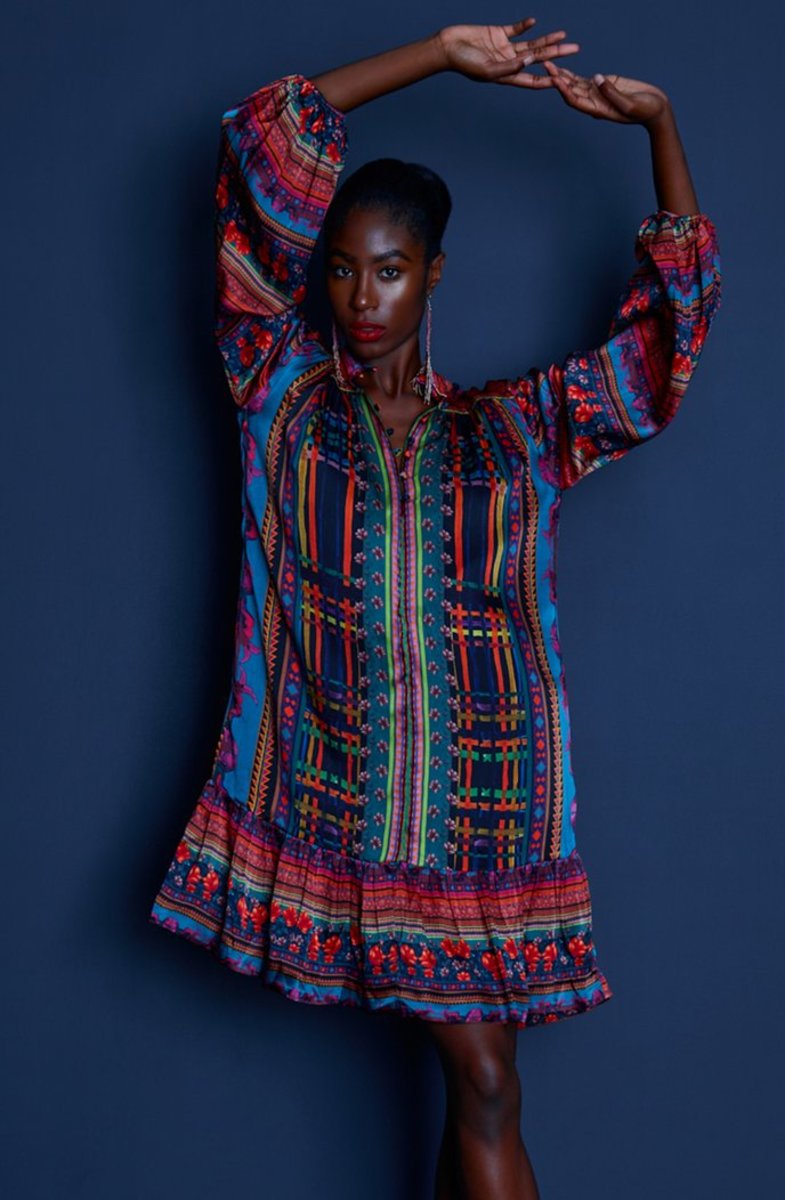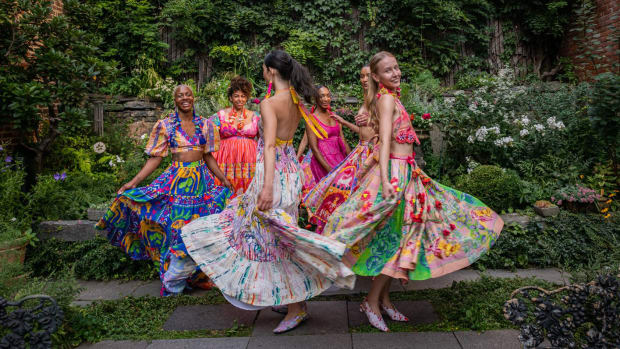Skilled artisans in India have long been quiet heroes in the fashion industry. We've seen their impressive embroideries and beadwork on the runway, on the red carpet and on the rack
at luxury retailers — but the glimmer and sparkle can be deceiving: Though the quality of this handiwork is incredibly high, it's been reported how that treatment of the workers responsible for it is not. Designer Roopa Pemmaraju wanted to change that.
She founded her namesake brand in 2012 as a love letter to these Indian artisans, who are often forgotten or cast aside in the global supply chain. A slow luxury fashion label, Roopa Pemmaraju specializes in dreamy, flowy dresses and separates with silhouettes that take cues from traditional sarees, updating them in new color palettes each season. (Think moodier, introspective hues for fall, bold and vibrant tones tinting for spring.) In September, Pemmaraju showed her latest collection filled with whimsical prints and exquisite florals inspired by British gardens in India and hand-embellished Swarovski crystals throughout, at New York Fashion Week in September.
Born and raised in Bangalore, India, Pemmaraju inherited an interest in making clothes from her grandparents: "They never went into a store, but they made their own," she tells me over the phone.
Recommended Articles
"My grandmother would make her own sarees. She would cut flowers from her garden, pick out the colors, and then she would give them to her weaver friends who were there in the community. Then the money would go back to the person who has done all the hard work."
A fascination with this harmonious exchange with the artisan community encouraged Pemmaraju to study fine arts in college and pursue a career in fashion, working at companies like Tommy Hilfiger. Then, in 2005, Pemmaraju moved to Australia and got a master's degree in fashion and textiles; when studying supply chains, she realized that while many fashion brands view India as a manufacturing hub, they don't acknowledge the power of the artisans responsible for it. It soon became her primary purpose, to redirect attention to the communities that make up the backbone of the Indian garment supply chain. Plus, she wanted to make clothes that respect people, as well as the planet.
Pemmaraju's first collection came to life at Sydney Fashion Week in 2012, where she worked closely with Australian artists to design a 26-look range inspired by Indigenous art. She then called on Indian craftspeople to print, cut and sew each piece.
"Everything was made with 100% sustainable fibers, so in cotton and linen," she says. "I had that vision since the time I started that I would not use any unnatural fibers or any unnatural weave and try to support hand skills, especially with artisans who can hand-weave textiles, which is just so luxurious."
Pemmaraju didn't have trouble building her network of artisans because she speaks all the local languages. Plus, her mother (who's also her business partner) already had established relationships with many handweavers. "We have 50 houses who are weaving — it's not like a set factory, because weavers are in their own houses, so they don't have to come out of their own secure life," she says. "They work from their own houses and their own atmosphere, and then they ship whatever is made, back to my atelier in Bangalore."
That inaugural line was an immediate hit, with local department store called David Jones — the "Neiman Marcus of Australia" — placing the brand's first order. A year later, Anthropologie came along.
"We've collaborated with them since 2013," Pemmaraju says. "Lately, we're just doing so many different categories for them only because I can sustain the people back in India and give them jobs."
Due to the handmade nature of the clothes and the high quality of the fabric, most of Roopa Pemmaraju's pieces are sold at a luxury price point, ranging from around $400 to $2,000; accessories are slightly lower, with a saree-inspired, rich-textured bag with hand-beading retailing for $580 and a handwoven silk wool bucket hat going for $280. The Anthropologie line is priced more affordably, to fit the market and to accommodate large orders: Items start at $60 for an embellished knotted headband and go up to $430 for a beaded silk organza maxi dress.
"It's still 100% made by natural fiber, it's still my same people who are creating it," Pemmaraju says of the Anthropologie line.
When the pandemic struck, Pemmaraju harnessed the resources of the Philidelphia-based company to make almost 80,000 face masks using some of her vibrant prints. This project helped her business to sustain over 200 people's jobs.
Pemmaraju is looking to further support her artisans, as well as communities in Vietnam, Mexico and Africa, as she plans to enter the home category early next year. Her goal with homewares is the same as with clothing and accessories: "To collaborate and give back jobs to the people."
Never miss the latest fashion industry news. Sign up for the Fashionista daily newsletter.





